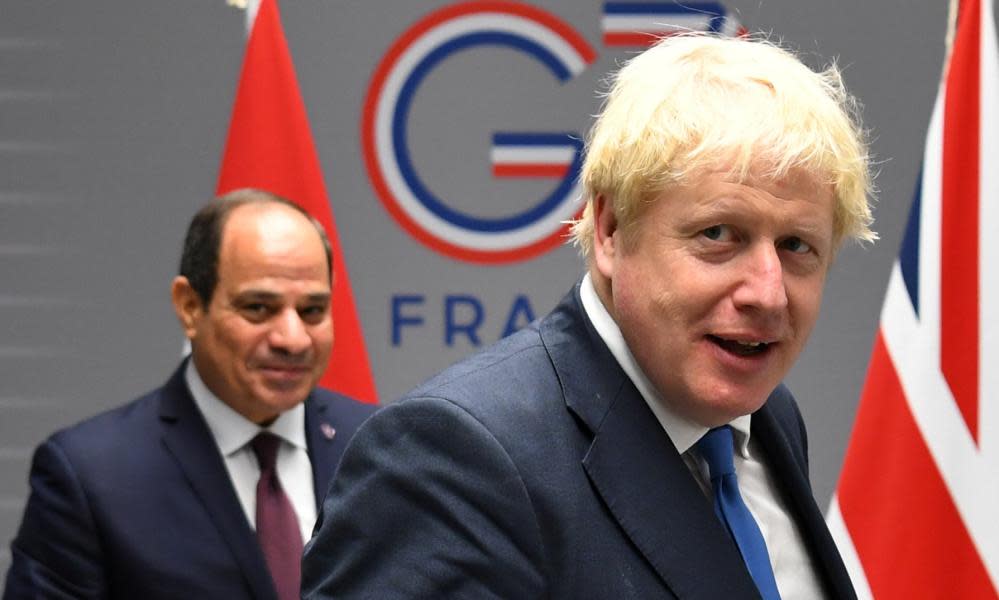Johnson offers words of praise to Egypt's leader despite repression

The prime minister, Boris Johnson, lavished praise on Egypt at a bilateral meeting with its president, Abdel Fatah al-Sisi, in New York, hours before the UK hosted a global media freedom conference with Amal Clooney, the UK’s special envoy on media freedom.
Sisi has just instigated a fresh massive crackdown on journalists following the outbreak of protests against corruption in Egypt.
As part of the repression, the Egyptian government has added the BBC and the US-based Arabic language Alhurra news channel to 513 websites already blocked in Egypt. In addition, online messaging applications have been disrupted to thwart further protests. The Egyptian government has also sent advisory warnings to foreign reporters on how they must cover the protests.
Civil society groups, including the Egyptian Centre for Economic and Social Rights, said so far 1,003 people had been arrested including prominent academics.
Johnson and Sisi held their bilateral meeting on the margins of the UN general assembly hours before the UK hosted a high-profile event designed to drive home its support for a campaign to develop new laws that will defend journalists’ rights.
But the president’s spokesman Bassam Radi reported after the meeting with Johnson that the UK was “keen to praise Egypt’s economic performance noting that the Egyptian economy is witnessing an obvious improvement”.
The presidential spokesperson also said the two leaders discussed efforts to curb terrorism and extremism, enhancing the exchange of information and preventing funding for terrorist activities.
Related: Contractor, actor … protest leader? The Egyptian exile driving rare dissent
The bland Downing Street read-out of the meeting also made no mention of the crackdown on protests. It simply said “the leaders recalled their constructive meeting at the G7 Summit in Biarritz and reconfirmed their commitment to work together to build on the positive progress in our bilateral relationship”.
It added “They discussed our two countries’ economic ties and the importance of building on this after the UK leaves the EU”.
Officials said the media crackdown may have been raised privately with Sisi. But the absence of any criticism of the assault on press freedom in the read-out raises questions about whether the UK government is willing to hold repressive autocrats to account in public about issues of media freedom, especially if commercial ties might be threatened.
Pressed at the media freedom summit in New York on whether ministers are prepared to make its case directly to resistant world leaders, Lord Ahmad, the human rights minister, said the UK government often raised human rights issues in private as well as public. He insisted this private pressure had an effect.
The UK held a high-profile media freedom conference in the summer and Clooney, a champion of threatened journalists, has helped established a high-level panel of legal experts to examine what global laws are needed to defend press freedom globally.
At the meeting in New York, Ahmad reaffirmed the UK’s intention, after Brexit, to establish a UK global human rights sanctions regime to hold those who commit serious violations of human rights to account, including when journalists, whistleblowers and human rights defenders are targeted. He said a statutory instrument would be introduced as soon as possible.
Clooney, the leading lawyer defending journalists under threat, said: “If democracy is to have any chance of survival we need leaders who believe in liberal values to step up.”
Related: Trump's rhetoric 'makes journalists vulnerable to abuse', says Amal Clooney
She said journalists were made incredibly vulnerable by the rising drumbeat of senior officials vilifying the media and creating a toxic environment.
She said the current international treaties defending freedom of expression were ineffective, adding the team of senior legal experts created two months ago and chaired by former supreme court president Lord Neuberger set up by the UK Foreign Office was drawing up model laws needed to embed a genuine free press.
She favours five new tools including targeted sanctions regimes, freezing bank accounts and entry bans against state officials that abuse media freedom, deployment of a team of international lawyers capable of investigating attacks, a commitment to transparency when a journalist is arrested, enhanced consular advice and a system of visas for reporters suffering persecution.

